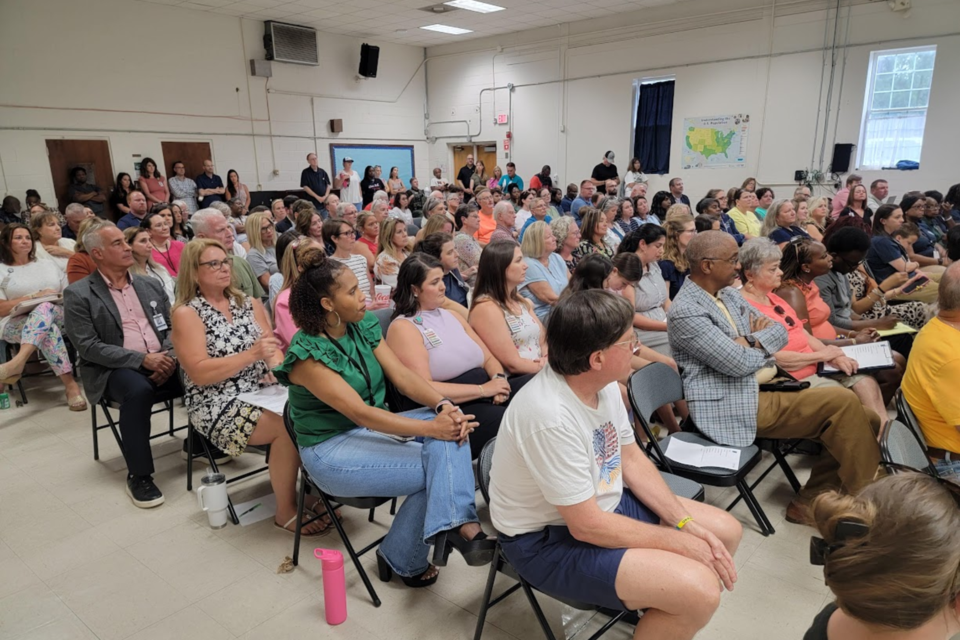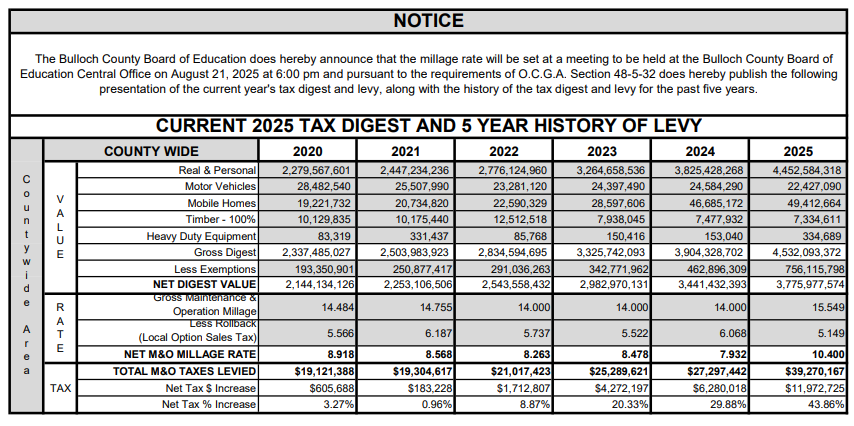The Bulloch County Board of Education (BOE) has voted to adopt a tentative millage rate of 10.400 mils for the upcoming fiscal year which will require an increase in property taxes by 39.67%. This represents an increase of 2.954 mills over the current rate of 7.446 mills.
The proposed tax increase for a home with a fair market value of $300,000 would be approximately $348.57, while for a non-homestead property valued at $275,000, the increase would be approximately $324.94.
The decision, made during a three hour meeting on Wednesday, July 30, 2025, was not unanimous and followed a lengthy discussion among board members and Superintendent Charles Wilson. The vote passed with a 5-3 margin, with Board Members Lannie Lanier, Jennifer Mock and Lisha Nevil voting against the increase. The meeting was moved to the Transition Learning Center to accommodate the large crowd of citizens who attended.
The increase is being proposed to address a projected $15 million deficit in the school system's FY2026-2027 budget. Board members in favor of the increase emphasized that it would help prevent significant cuts to staff and educational programs along with closure of the Transition Learning Center, and would provide financial stability for the school district. They argued that waiting to address the deficit would only lead to more difficult decisions in the future, including potential layoffs and reductions in services for students.
Board members who voted against the increase expressed concerns about the impact on taxpayers and the timing of the decision. They noted that the board had previously approved a budget based on a lower millage rate and that the change might be seen as a broken promise to the community. They suggested that the school district should first look at making cuts or using reserve funds to cover the deficit before raising taxes.
Superintendent Wilson clarified that the millage rate would take effect this year, and the impact of the new revenue would be seen in FY26. He also acknowledged that the decision to raise the millage rate was a difficult one but necessary to ensure the long-term health of the school system.
Public comments
During the meeting 25 individuals addressed the board of education during public comments. Of those who spoke, 24 were in favor of the millage rate increase, while one individual opposed it.
Here is a summary of the public comments:
Arguments in Favor of the Millage Rate Increase
-
Impact on Students: Speakers overwhelmingly emphasized that the proposed cuts, a result of not raising the millage rate, would harm students—especially those who are economically disadvantaged or require specialized support. They cited concerns over increased class sizes, a decrease in individualized instruction, and the potential elimination of vital programs like the Transitions Learning Center (TLC) and Life Program, which provide second chances and support for at-risk students.
-
Teacher and Staff Retention: Many speakers, including current and former educators, warned that a reduction in force would lead to a loss of experienced, talented teachers. They argued that competitive salaries and a supportive environment are crucial for attracting and retaining quality educators and that the proposed cuts would destroy morale and make the district less competitive with neighboring counties.
-
Community and Economic Health: Several community members, including City Manager Charles Penny, connected the quality of the public school system to the overall economic health and desirability of the county. They argued that strong schools attract families and businesses, lead to higher property values, and contribute to a skilled local workforce. Conversely, underfunded schools could negatively affect everything from faculty recruitment at Georgia Southern University to public safety.
-
A Moral and Ethical Responsibility: Multiple speakers framed the decision to raise the millage rate not just as a financial choice but as a moral and ethical responsibility to the community's children. They stressed that this is an investment in the future and urged the board to "do what is right" rather than what is popular.
-
Comparison to Other Counties: A few speakers pointed out that other Georgia counties have higher millage rates, suggesting that a small increase would align the district with regional norms and provide the necessary funding to remain competitive.
Arguments Against the Millage Rate Increase
-
Wasteful Spending: The one person who spoke in opposition believed the district has enough in reserves to avoid cuts for the time being.
-
Need for Time to Find Solutions: This speaker suggested that the board has time to find "real solutions" by working with state officials to clarify and improve the funding formula. They expressed a desire for a more strategic, long-term approach rather than what they saw as an immediate and unnecessary tax increase.
Next steps
The school board will hold three public hearings to gather community feedback on the proposed millage rate before taking a final vote. The hearing dates are scheduled for:
- Thursday, August 14, 2025 at 12:00 noon
- Thursday, August 21, 2025 at 9:00 am
- Thursday, August 21, 2025 at 6:00 pm
The final vote on the millage rate will be after the 6:00 pm public hearing on August, 21, 2025.
Presentations
Click here to view Superintendent Wilsons full presentation
Click here to view the millage rate presentation





